Dr. Kofi Abrefa Busia, Ghana’s Prime Minister during the Second Republic, is a figure deserving of national recognition and lasting commemoration, according to prominent members of the New Patriotic Party (NPP). They argue that Dr. Busia’s instrumental role in restoring civilian rule after a period of military governance, coupled with his significant contributions to the nation’s political and intellectual landscape, warrants a more substantial tribute, particularly in his hometown of Wenchi. These calls for recognition come on the 47th anniversary of Dr. Busia’s death, a moment of reflection on his legacy and impact on Ghanaian history.
The NPP members acknowledge that the party and the government have not entirely neglected the Busia family, citing examples such as the appointment of Dr. Busia’s nephew, Obeng Busia, to the National Sports Authority during the Kufuor administration, and the recognition given to his sister, the late Ama Busia, as a member of the NPP’s National Council of Elders. However, they emphasize that these gestures fall short of adequately honoring the stature and contributions of Dr. Busia himself. They believe a more enduring tribute is needed, one that reflects his pioneering role as a political leader from the Bono region and his commitment to democratic principles.
A key proposal put forth is the construction of a monument dedicated to Dr. Busia. Such a monument, they argue, would serve as a tangible symbol of his enduring legacy and a testament to his contributions to Ghanaian society. This call for a monument is not simply a plea for recognition; it’s an appeal for a visible and permanent reminder of the values Dr. Busia championed, particularly his dedication to democratic governance, press freedom, and local government development. It’s a call to inspire future generations with the story of a leader who prioritized the well-being of his nation.
In addition to the monument, there are calls for the rehabilitation of the Busia Mausoleum in Wenchi, where Dr. Busia’s remains are interred. The proponents of this restoration project argue that the mausoleum’s current state is not befitting the stature of the individual it commemorates. They envision a revitalized mausoleum not just as a place of respect and remembrance, but also as a potential tourist attraction, drawing visitors to Wenchi and contributing to the town’s economic development. This dual purpose underscores the belief that honoring Dr. Busia can also benefit the community he hailed from.
The advocates for these initiatives highlight the perceived discrepancy between the historical significance of Wenchi, given its connection to Dr. Busia, and its current state of development. They believe that the town’s historical prominence, linked to the contributions of its most famous son, should be reflected in its infrastructure and overall progress. The call for development, therefore, is intertwined with the call for recognizing Dr. Busia’s legacy. They see the two as mutually reinforcing: honoring Dr. Busia could attract investment and attention to Wenchi, furthering its development, and the town’s development would, in turn, serve as a fitting backdrop to a monument honoring its most distinguished citizen.
The overarching argument presented by these NPP members is that Dr. Kofi Abrefa Busia deserves more than just the acknowledgment of his family’s involvement in national affairs. They believe that his individual contribution to Ghana’s political history and democratic values warrants a more substantial and permanent form of recognition. The proposed monument and the rehabilitation of the mausoleum are not just about remembering the past; they are about inspiring the future. They are a call to create tangible reminders of Dr. Busia’s legacy, which can serve as a source of pride for the people of Wenchi and a source of inspiration for all Ghanaians who strive for democratic governance and national development. These initiatives aim to ensure that Dr. Busia’s contributions are not relegated to the annals of history but remain a living testament to the power of principled leadership and the enduring pursuit of a better Ghana.














